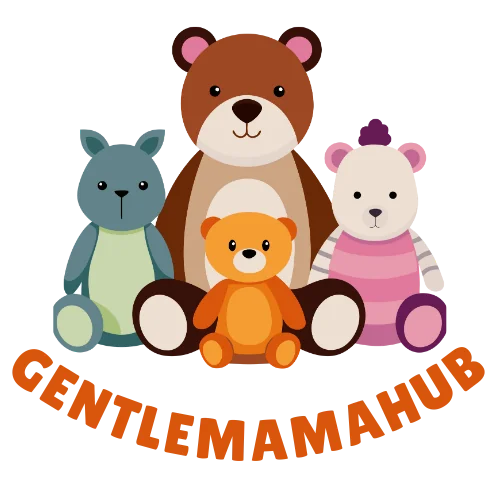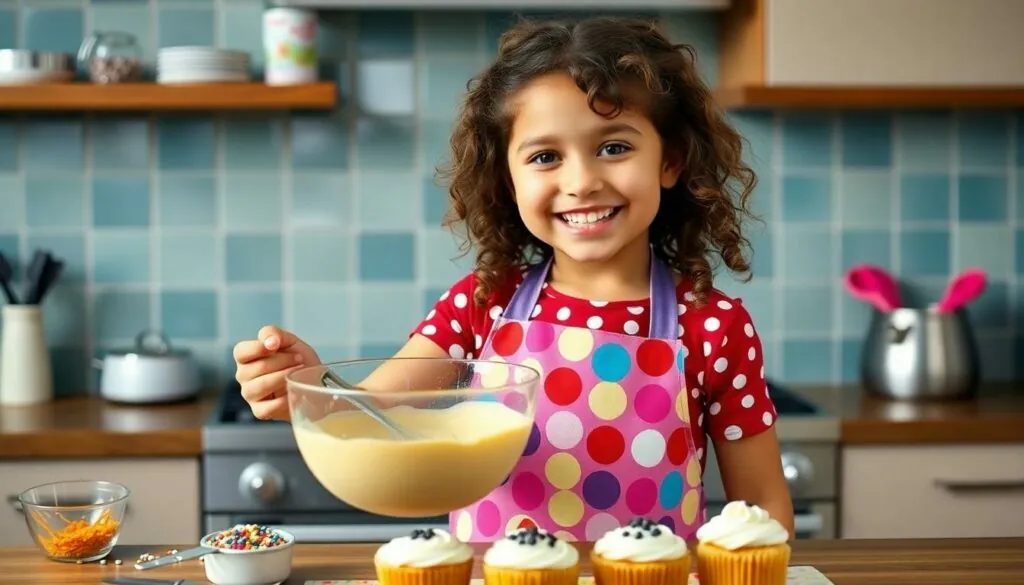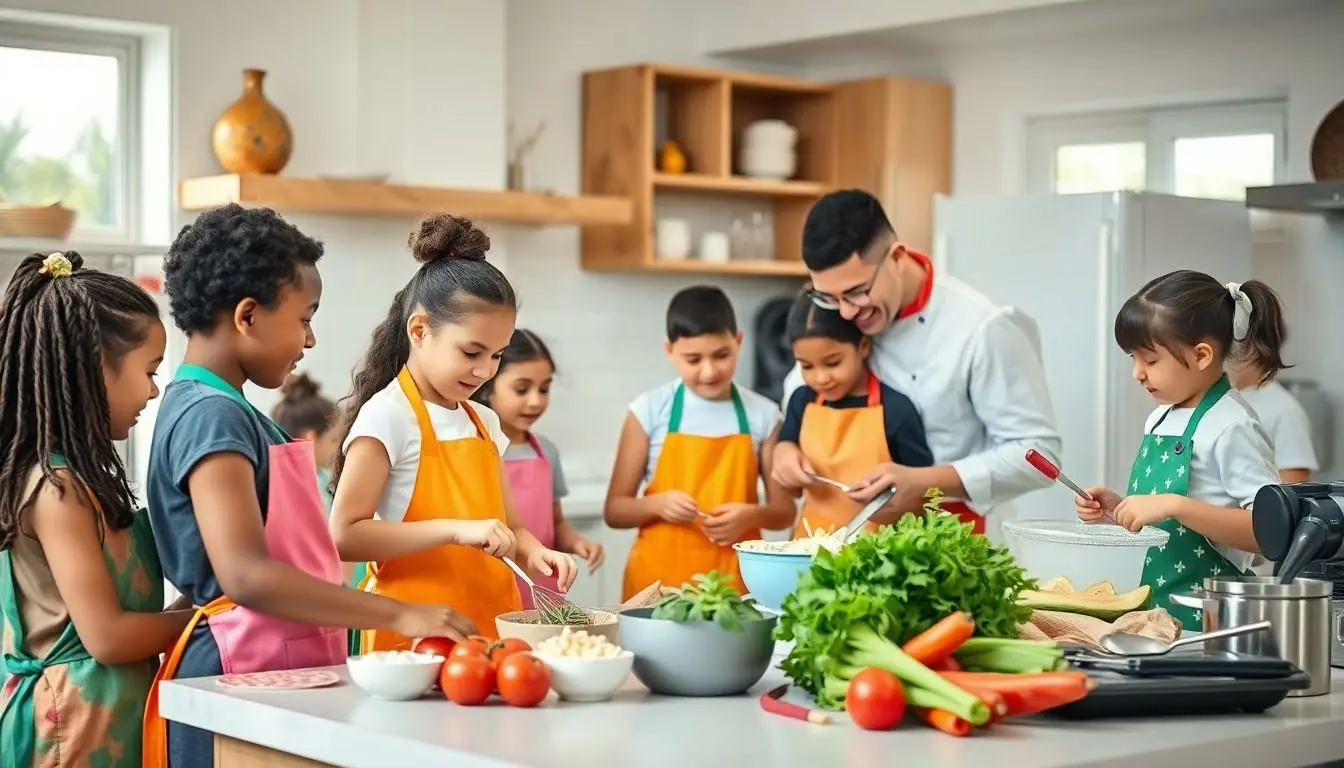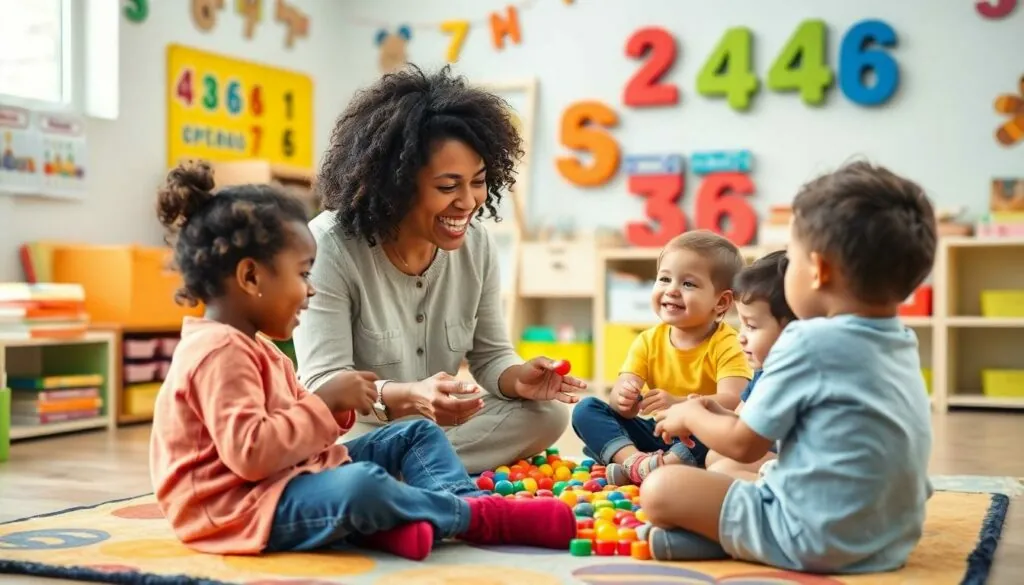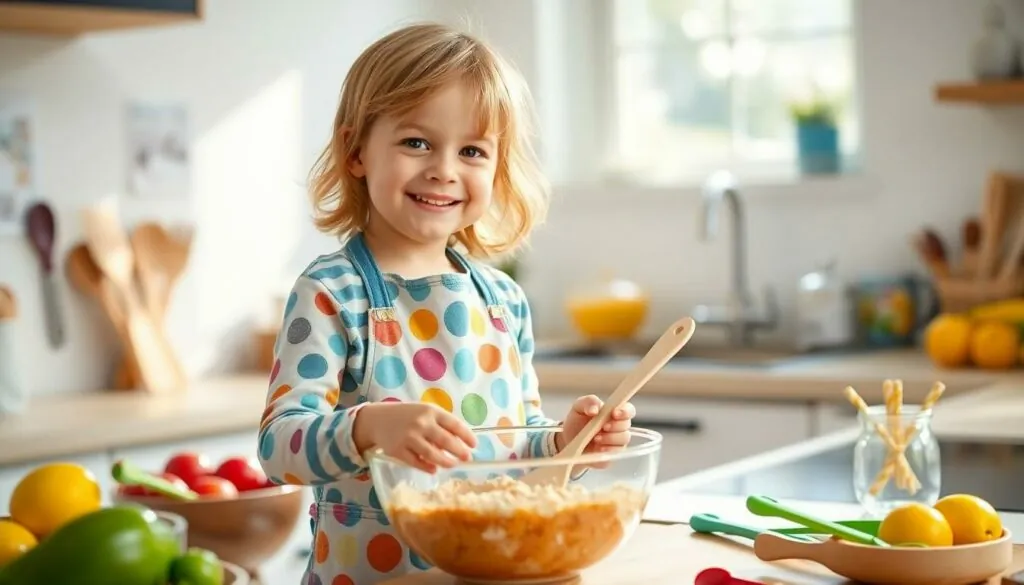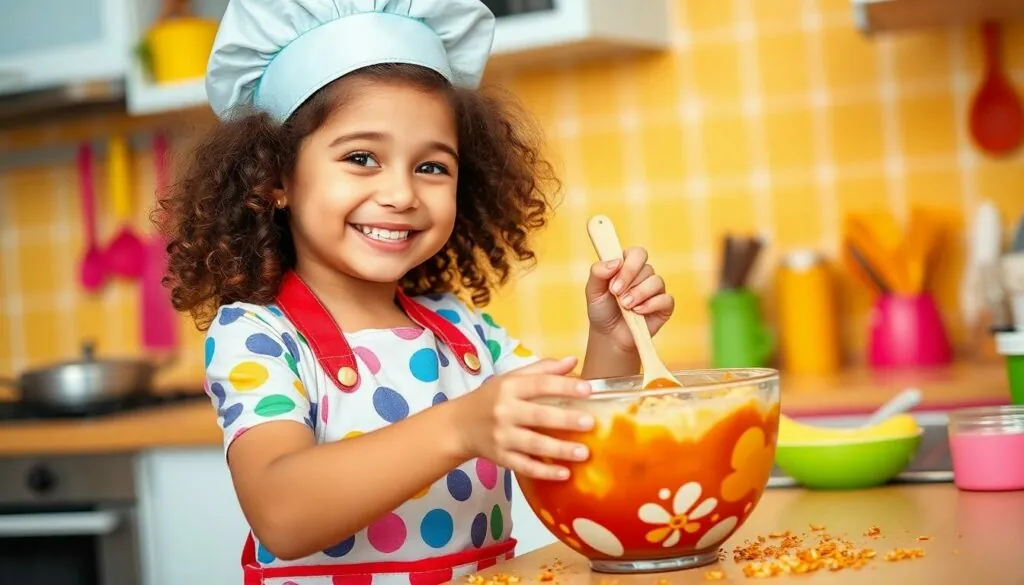Table of Contents
ToggleGetting kids excited about cooking can feel like trying to teach a cat to swim – challenging but not impossible! Parents searching for “cooking for kids near me” understand the importance of nurturing their little ones’ culinary curiosity while keeping things fun and safe in the kitchen.
Benefits of Local Cooking Classes for Children
Local cooking classes transform children into confident young chefs through hands-on learning experiences. Professional instructors create a safe educational environment where kids develop essential life skills alongside their culinary abilities.
Social and Educational Advantages
Cooking classes enhance children’s mathematical abilities through measuring ingredients calculating portions. Kids practice reading comprehension by following recipes interpreting instructions. Group cooking activities foster teamwork collaboration as children work together to complete culinary projects. Students learn cultural awareness by exploring international cuisines traditional cooking methods. The structured environment promotes focus attention to detail time management skills.
Building Confidence in the Kitchen
Children master basic cooking techniques starting with simple tasks progressing to complex recipes. Kids learn proper knife skills food safety protocols essential kitchen safety rules. Hands-on experience with kitchen equipment builds familiarity comfort in food preparation. Students take pride in creating dishes independently sharing their culinary achievements with family. Each successful dish reinforces problem-solving abilities boosts self-esteem. Local instructors provide immediate feedback encouragement helping children overcome kitchen challenges. Kids develop decision-making skills by selecting ingredients modifying recipes experimenting with flavors.
Finding Kid-Friendly Cooking Programs Near You
Local cooking programs offer structured culinary education specifically designed for children. Parents discover these programs through multiple channels that cater to different age groups preferences.
Local Community Centers and Schools
Community centers host after-school cooking classes for kids aged 6-12 years. Recreation departments organize seasonal cooking camps during summer spring breaks featuring themed sessions like “Junior Baker” “Global Kitchen Explorer.” Public libraries partner with local chefs to conduct monthly cooking demonstrations complete with take-home recipe cards safety guides. Many elementary schools incorporate cooking activities into their enrichment programs teaching basic food preparation skills nutrition education.
Professional Cooking Schools for Kids
Culinary institutes provide specialized cooking courses tailored for young chefs aged 8-15. These programs feature professional-grade equipment small class sizes certified instructors. Students learn knife skills kitchen safety food handling techniques in state-of-the-art facilities. Notable cooking schools offer:
| Program Features | Duration | Age Groups |
|---|---|---|
| Basic Skills | 4 weeks | 8-10 years |
| Advanced Tech | 6 weeks | 11-13 years |
| Chef Training | 8 weeks | 14-15 years |
- Weekly hands-on cooking sessions
- Food science experiments
- Culinary math activities
- Kitchen safety certification
- Recipe development workshops
Popular Types of Children’s Cooking Classes
Local cooking classes for kids offer diverse learning formats to accommodate busy family schedules. These programs focus on age-appropriate culinary skills through structured hands-on experiences.
After-School Programs
After-school cooking programs combine culinary education with supervised activities from 3 PM to 6 PM on weekdays. Students learn basic kitchen skills like measuring ingredients, following recipes, and kitchen safety protocols. Professional instructors incorporate math concepts through recipe scaling, science through chemical reactions in baking, and reading comprehension through recipe interpretation. These programs feature:
- Weekly themed menus focusing on seasonal ingredients
- Small group stations with 4-6 students per instructor
- Take-home recipe cards for family cooking practice
- Progressive skill development across multiple sessions
- Healthy snack preparation techniques
Weekend Workshops
Weekend cooking workshops operate on Saturdays and Sundays in 2-3 hour sessions. These concentrated classes emphasize specific culinary techniques or cultural cuisines. Popular workshop themes include:
- International cuisine exploration (Italian pasta making, Asian stir-fry)
- Baking fundamentals (bread making, cookie decoration)
- Farm-to-table cooking using local ingredients
- Holiday themed meal preparation
- Parent-child cooking experiences
The workshops maintain a 1:8 instructor-to-student ratio to ensure proper supervision. Students receive ingredient kits, cooking tools, and digital recipe collections for continued practice at home.
What to Look for in a Children’s Cooking Program
Selecting the right cooking program ensures children receive quality culinary education in a safe environment. Local cooking programs offer diverse learning opportunities tailored to young chefs’ needs.
Age-Appropriate Instruction
Quality cooking programs group children by age ranges: 4-6 years, 7-10 years, 11-14 years. Each age group receives specialized instruction matching their developmental abilities. Younger children focus on basic tasks like measuring ingredients, mixing, spreading, kneading dough. Elementary-age students learn knife skills with appropriate tools, stovetop cooking under supervision, recipe reading. Teen programs incorporate advanced techniques including meal planning, kitchen equipment operation, food presentation. Instructors adapt teaching methods using visual demonstrations, hands-on practice, step-by-step guidance based on age level comprehension.
Safety and Supervision Standards
Professional cooking programs maintain strict safety protocols with 1:6 instructor-to-student ratios. Students receive proper safety equipment including aprons, non-slip mats, heat-resistant gloves. Instructors hold food safety certifications, first aid training, background checks. Facilities feature child-height workstations, age-appropriate utensils, clearly marked safety zones. Regular equipment inspections, sanitization procedures, allergen protocols protect student wellbeing. Emergency procedures include posted evacuation routes, first aid kits, fire extinguishers. Parents receive detailed safety guidelines, medical forms, emergency contact procedures before enrollment.
Best Local Cooking Activities for Different Age Groups
Local cooking programs offer age-specific activities that match children’s developmental stages and culinary interests. Each program creates engaging experiences through hands-on learning techniques tailored to specific age groups.
Classes for Preschoolers
Preschool cooking classes focus on basic food preparation skills using safe, child-sized equipment. Children ages 3-5 participate in sensory-rich activities like mixing ingredients, kneading dough, and decorating cookies. Local instructors incorporate counting exercises, color recognition, and simple measuring tasks into each 45-minute session. The curriculum includes fun projects such as creating fruit faces, assembling simple sandwiches, and making no-bake treats. Classes maintain a 4:1 student-to-teacher ratio with parent participation options available.
Programs for School-Age Children
Elementary-aged children engage in comprehensive cooking programs that build fundamental kitchen skills. Students ages 6-12 learn proper knife techniques with safety knives, basic stovetop cooking, and recipe reading. Local classes feature 90-minute sessions covering topics like breakfast preparation, healthy snacks, and international cuisine exploration. Programs incorporate science concepts through experiments with yeast, temperature changes, and chemical reactions in cooking. The curriculum includes kitchen math exercises, food safety principles, and nutritional education with a 6:1 student-to-teacher ratio.
| Age Group | Class Duration | Student-Teacher Ratio | Key Activities |
|---|---|---|---|
| 3-5 years | 45 minutes | 4:1 | Mixing, decorating, no-bake treats |
| 6-12 years | 90 minutes | 6:1 | Knife skills, stovetop cooking, recipe reading |
Conclusion
Finding the right cooking classes for kids near you opens up a world of culinary adventures and learning opportunities. Local programs offer safe environments where children can develop essential life skills while discovering the joy of cooking. From preschool classes with basic food prep to advanced courses for older children these programs create confident young chefs.
Parents who invest in local cooking education for their children provide more than just culinary skills. They’re gifting their kids with mathematical knowledge cultural awareness and teamwork abilities that’ll serve them well throughout life. With various programs available in community centers libraries and professional cooking schools families can easily find the perfect fit for their budding chef’s needs.
